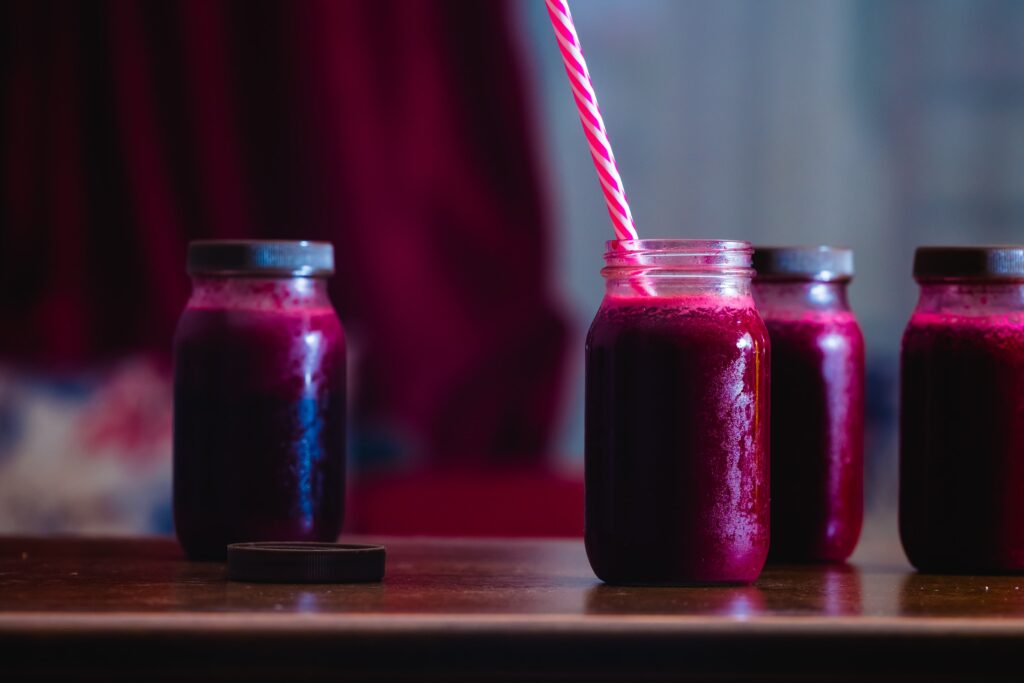Beet Juice. Is It Everything It’s Supposed To Be?

Over the past 10 years, beet juice has become an ever-popular supplement among endurance athletes. In this article, we will explore the advantages of beet juice. We will also explore what the research says about its effectiveness, and how to utilize the beet juice benefits as an athlete yourself.
Why Beet Juice?
Beets are one of the best vegetable sources of nitrates, which is where the performance benefit comes from. Other foods that have high levels of naturally occurring nitrate include celery, lettuce, and other leafy greens. When beets are juiced, an athlete is able to drink a much higher concentration of nitrates than what they would be able to consume in a salad or dish of roasted vegetables.
When absorbed, nitrates from beet juice improve muscle function by improving blood flow, oxygen flow, glucose uptake, and muscle contraction/relaxation. Specifically, the muscles in an athlete’s heart are able to work more efficiently, thus providing them with an overall boost in performance.
What The Research Says
While there are mixed results as to the effectiveness of beet juice for endurance athletes, many studies do show a performance benefit for athletes who supplement with beet juice. Generally speaking, the overall consensus is that beet juice is a positive supplement for athletes to try.
With beet juice, athletes are able to tolerate high-intensity exercise for a longer period of time than they normally would be able to. So, for example, the pace an athlete could typically hold for a 3 mile race may be the pace they could now hold for 3.5-4 miles when supplementing with beet juice.
How To Use Beet Juice To Improve Your Performance
There are a few considerations that seem to impact how well beet juice will work for an athlete. The research with the most positive results had the athletes follow similar regimens, which are outlined in the bulleted points below:
- Athletes only need to supplement with beet juice for 6-7 days before their key event or time trial to get a benefit. More chronic supplementation has not been well-researched and may pose negative health risks.
- When supplementing with beet juice, drink 13-16 oz of beet juice 1 ½ hours before the event. It takes about 2-3 hours for nitrates to peak in the bloodstream.
- Just use beet juice on its own. Pairing beet juice with additional supplements, namely caffeine, has not shown any additional benefit for athletes. If you typically use caffeine to improve your performance during a race, don’t expect to experience an additional boost by drinking beet juice.
- As a rule of thumb, don’t try using beet juice for the first time on your key race. I would recommend seeing how your body reacted to the juice for 2-3 days before a smaller (less important) race or workout that simulated a race-day effort well.
Sources Of Beet Juice
There are a variety of ways an athlete can supplement with beet juice. Athletes can juice their own beets at home or purchase ready-to-drink bottles of juice from the grocery store. Additionally, many supplement companies offer powdered forms of beetroot juice. If using a powdered form of beet juice, choose a company that is third-party tested or NSF Sport certified in order to assure the product is free from unsafe or banned substances.
Wrapping It Up
Endurance athletes can use beet juice to improve their performance. Beet juice is a great source of nitrates which help improve muscle function & efficiency for athletes. In terms of performance, an athlete who uses beet juice is able to hold a pace at a high intensity for a longer period of time than they normally would be able to. There are various factors that influence the effectiveness of beet juice, and it is important for athletes to use it properly.
Advertisement
References
- Domínguez R, Cuenca E, Maté-Muñoz JL, et al. Effects of Beetroot Juice Supplementation on Cardiorespiratory Endurance in Athletes. A Systematic Review. Nutrients. 2017;9(1):43. Published 2017 Jan 6. doi:10.3390/nu9010043
- Food sources of nitrates and nitrites: the physiologic context for potential health benefits1-3 – Scientific Figure on ResearchGate. Available from: https://www.researchgate.net/figure/Classification-of-vegetables-according-to-nitrate-content-1_tbl2_24424692 [accessed 15 Mar, 2023]
- Zamani H, de Joode MEJR, Hossein IJ, Henckens NFT, Guggeis MA, Berends JE, de Kok TMCM, van Breda SGJ. The benefits and risks of beetroot juice consumption: a systematic review. Crit Rev Food Sci Nutr. 2021;61(5):788-804. doi: 10.1080/10408398.2020.1746629. Epub 2020 Apr 15. PMID: 32292042.

Jackie Hendrickson RD, MPH is a registered dietitian with a Masters Degree in public health nutrition from Utah State University. Jackie is the owner of Enduura Nutrition and loves coaching her athletes to their athletic potential through sustainable training & nutrition principles. She is an avid road & trail marathoner with a background in collegiate track, cross country, and competitive swimming. Jackie and her husband, Adam, were teammates in college and continue to pursue their running goals together. They live in beautiful Ogden, Utah with their 2 year old son, Lincoln.









